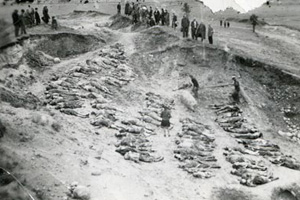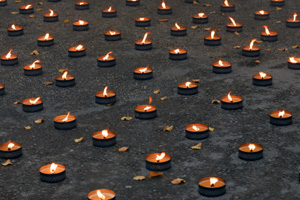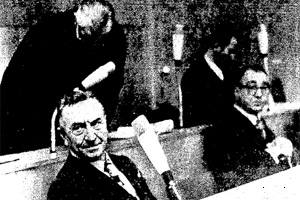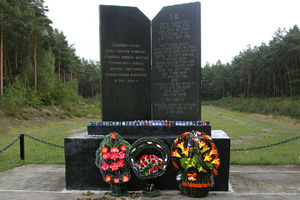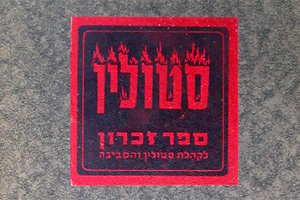Home » The Shoah
The Shoah
On the eve of Rosh HaShana 1942, 8,000 Jews who had been forcibly resettled in the Stolin Ghetto were led into the forest to a place known as Stasino. There, they were forced to undress and enter an enormous pit inside which they were surrounded by dead relatives and neighbors. This was place where the Jews of Stolin took their final, panic-strickened breaths. That day a Nazi police battalion with a few sub-machine guns ended the lives of thousands of human beings and with them the history of Jewish communities that had existed for hundreds of years.
Family History
Imagine—
they lived on this earth but were forbidden to leave a trace
Imagine—forbidden to leave a trace
but I’m here with no choice but to tell you
how Yelena flipped pancakes while holding a book in her other
hand, because there was never enough time to read
how Sabina and Yitzhak would sing a capella,
and the neighbors were grateful for their gifts
how they worried about making ends meet with five daughters
and no money since the mill burnt down
how Basia published poems when she was 14 and she received a letter
saying: the crown of the poet belongs on your head
how the twin sisters left Kostopol for Warsaw to study
and Basia married Pesach
and Sabina married Olek
for love was burning
how Sabina escaped from Warsaw while the bombs were dropping,
and Olek was arrested by the Russians and Sabina went with him to
Siberia
how they sent Pola, Miriam and Sonia off on a train to who knew
where they would end up
how they stayed behind hoping that the worst was already past,
but it was only just beginning
and how basia and Pesach had a son called Mordechai
and how they were forced to watch as Pesach was beaten to pieces
and how Yitzhak died that night of a shattered heart
and how Mordechai was two years old when he was buried alive
and how Yelena and Basia starved in the ghetto
until they were forced
to dig their own grave in the football field
forbidden to leave a trace
And I repeat:
Yitgadal veyitkadash shemey rabah
and I ask:
make me a channel of your peace;
where there’s despair in life, let me bring hope;
where there is darkness only light;
and where there’s sadness, ever joy…
For further research:
Compiled by and Copyright © 2020 Joshua S. Perlman and Adina Lipsitz This site is part of JewishGen’s KehilaLinks (formerly ShtetLinks) project. This site is hosted at no cost to the public by JewishGen, Inc., a non-profit corporation. If you feel there is a benefit to you in accessing this site, your JewishGen-erosity is appreciated. This site uses the Anthology Premium Website Template by Pexeto. |
Updated 20 December, 2020 |
